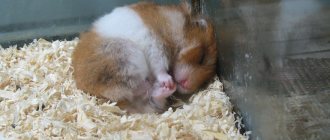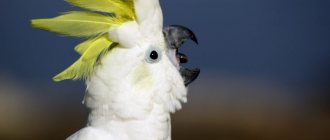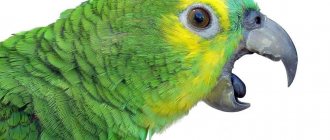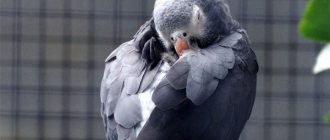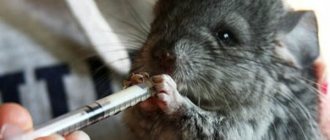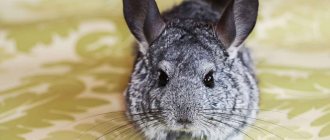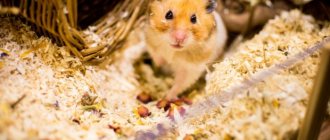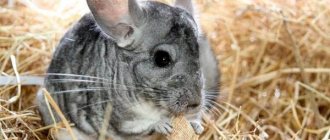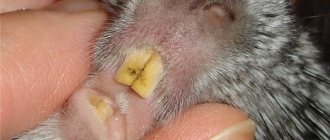Chinchillas are generally active animals, and at night they are especially active by nature. The fact that a chinchilla does not sleep at night is not a problem as long as it does not start making a lot of noise or screaming. There are many reasons why a chinchilla screams at night, and in this article we will try to consider all the reasons so that you can avoid them.
First of all, you need to look at the conditions of the chinchilla, whether it eats properly, whether the conditions in the cage are comfortable for it and whether you spend time with it. The animal needs to put its energy somewhere, and if you don’t play with it, it will do it itself and, as usual, chinchillas play at night, and during the day it will sleep.
Reasons why a chinchilla makes noise at night
- Natural features. In their habitat, chinchillas search for food and walk only in the evening and at night. Hence the question, why wouldn’t they behave like this at home? The habit is fixed at the genetic level and you won’t be able to completely get rid of it, but you can partially wean your chinchilla off making noise at night. There are special methods for this, but they are all based on the fact that you play, swim or walk with your animal in the evening or at least in the afternoon. Then he will not have the strength to tear and throw as usual, he will become quieter, and after 2-3 hours of activity at night he will most likely fall asleep or sit silently.
- New neighbor When a chinchilla is given a new neighbor, in 90% of cases she will argue with him, and sometimes fight. Over time, they will get along together, but they will still have to endure it, so at night they will run and swear among themselves. You can transplant a new chinchilla into a separate cage overnight, but then the process of getting used to each other will take a long time.
- Mating The mating process itself takes place very quickly, but courtship or games can last all night. It is especially bad for the owners when the female, for some reason, rejects the male and he begins to get angry, such a couple produces even more noise, and sometimes even a stench.
- Incorrectly equipped cage. If your chinchilla has noisy toys, then don’t be surprised why it’s hard to sleep in your room. For your peace of mind, it is necessary to equip the cage so that all the toys are firmly secured and do not fly apart when the chinchillas are actively running. If you have a running wheel, then you need to buy one that is as silent as possible.
Nutritional diseases
Diseases of chinchillas, characterized by an upset stomach, occur when feeding low-quality or improperly prepared food. Digestive disorders are caused by dusty or moldy hay or a sudden change in diet. Before giving the animal treats, you need to study the available literature, finding out what is possible, in what quantity, and what should be discarded. The best option is to feed industrially prepared granular feed. Farmers raising chinchillas, in order to reduce the cost of feed, can prepare it themselves by copying the recipe.
Healthy food for chinchillas
Most often, chinchillas experience the following diseases of the alimentary tract:
- Gastroenteritis.
- Flatulence.
- Constipation.
- Diarrhea.
Gastroenteritis
The disease is characterized by diarrhea that occurs as a result of feeding errors or as a symptom of another illness. Dysbacteriosis may develop as a result of uncontrolled use of antimicrobial agents. It is necessary to monitor the water; pathogenic microflora develops in it if it is rarely changed. The animal is advised to fast for one and a half days, boiled water, followed by feeding with pellets. As antidiarrheal agents, you can use astringents at home - oak bark, etc., or natural sorbents, for example, Smecta. The use of antimicrobial medications is carried out under the supervision of a veterinarian.
This food can harm your chinchilla
Constipation
The cause of the disease may be adynamia or overfeeding the animal with some kind of delicacy. In this case, fasting, the use of an enema or laxatives are indicated.
Flatulence
This disease occurs due to the fault of the rodent owner who fed him fresh or stale greens. The animals are depressed, lie motionless, the abdomen is swollen, and significant hypothermia is observed. The chinchilla is given sorbents and the stomach is massaged. It is better not to use antimicrobial agents without consulting a veterinarian.
Why does a chinchilla scream at night?
Let's start with the fact that if an animal can make sounds, and at night it is especially active, then it is logical that at night it can scream. You had to be prepared for this even before purchasing the animal. But don’t be alarmed, chinchillas don’t scream so loudly and there are always reasons for this that can often be solved.
The signals given by these furry rodents are unique, each of them is characteristic of a particular situation. They differ in height, mainly high-frequency ones predominate, but there are also low ones, which are often difficult to distinguish by human hearing. All types of squeaks produced by these animals can be divided into several groups:
Please note that each chinchilla is unique, so some rodents are talkative, while others are silent. Lonely pets squeak much less than a couple, because they have no one to communicate with.
Chinchillas make sounds when:
- Marriage contact and dating before this
- While eating
- When they are still cubs
- Angry and angry
- Depressed and depressed state
- Anxiety or due to external stimuli
In this article we have collected all the sounds that animals make, you can listen to them and perhaps you will find exactly the one that your chinchilla makes at night.
Squeaks and twitches
There are a huge number of reasons why a healthy animal begins to scream and convulse.
- Lack of B vitamins and microelements.
- Insufficient blood glucose levels (hypoglycemia).
- Back injuries.
- Stress.
- Problems with cerebral vessels.
- Inability to absorb calcium.
- Poisoning.
- Heart attack.
- Epilepsy, etc.
During an attack, the animal should not be touched.
After the seizure passes, you need to take measures:
- Remove the pet from the cage.
- Give some kind of treat (a raisin or a piece of date).
- Give an injection of dexamethasone (intramuscularly), this will help the animal return to normal.
- Calm your pet and talk to him.
- Examine the rodent for bruises and injuries.
- Place the animal in a quiet, warm area.
But, all these measures in no way replace an examination by a veterinarian and drug treatment. Therefore, after an attack, you should show your pet to a doctor as soon as possible.
A chinchilla is an animal that requires a special approach. It will take time and effort to gain his trust. And, to understand the language, you will have to learn to compare the behavior and sounds made by the pet. In addition, a furry friend needs care, sensitivity, and attention.
Source
Mating sounds
When you have a female and a male living together, sometimes they will mate. The sound when they are both ready for their wedding night is very different from the others and resembles a very soft grunt. With the help of sounds, they call each other to contact and the tone of their sounds can constantly change. The male may also make unpleasant sounds when the female refuses to mate with him.
When you are walking with a pair of chinchillas, without seeing each other, they can use a sound that is a call for a lost partner. The sound is very unusual and from its tone it seems that it is a sound of interest; in itself it is short, but frequent.
During the mating season, in addition to sounds, chinchillas make noise at night because:
- The male clears the floor on himself
- Actively wagging its tail
- Makes sounds when ready to mate
If she runs away from the male, she will make this sound more often, and then it can develop into a sound of discontent. After successful mating, the male makes a strange hoarse sound that can only be compared to hiccups.
Shedding fur
Shedding fur should not be confused with the natural process of shedding.
A chinchilla should shed slowly and regularly. Therefore, if a chinchilla is completely bald, perhaps something has frightened it very much.
Rapid fur release is a defense mechanism used when a chinchilla feels trapped or threatened. Animals often use this in the wild, for example if a chinchilla is caught by a predator. But pet chinchillas can also shed fur if they are in a stressful situation.
Shedding fur is also a natural process and should not cause much concern to pet owners. If your hairless chinchilla is feeling normal, carefully inspect all exposed areas of his skin. You don't need to go to the vet or treat the bare skin area unless it starts to look painful.
Sounds of cubs
Baby chinchillas make a lot of sounds because they are still small, afraid of everything, constantly playing and exploring the world. For us, all their sounds look like squeaks, but the female clearly distinguishes them and understands what the cubs need.
If you hear rumbling, then these are sounds of pleasure when they are full and happy. At the same time, their mother also purrs, but more often during feeding.
Usually, a lot of noise and squeaking is made by cubs that have been separated from their mother. They often make loud squeaking sounds and, in addition, constantly crawl around the cage in search of their mother. They also begin to communicate with each other more often if you have several cubs.
The most common noise baby chinchillas make at night is that they are hungry. This sound is also accompanied by the fact that the cub nuzzles its mother or simply goes to her. This squeak is very different from others, as it is very short and sharp.
Poisoning
Poisoning is a dangerous and serious disease. There are many reasons for poisoning, most often from bacteria or poor quality food. Check your chinchilla's throat first because the symptoms may be similar when a foreign object is lodged in the chinchilla's airway.
Symptoms of food poisoning in chinchillas:
- Vomiting or urge to vomit
- Mucus or foam around the mouth or nose
- Weakness and reluctance to move
- There may be bloating in the stomach
- Sometimes accompanied by diarrhea
Poisoning can cause new diseases and often lead to death if treatment is not started in time. If you see that the animal’s condition is worsening every hour or two, it is better to contact a veterinarian before irreversible consequences occur.
If your pet is feeling normal and stable, you can treat it yourself.
Treating the infection is quite difficult and it is best to contact a veterinarian. Unfortunately, there is very little information on treatment on the Internet; in this article we have collected all the instructions on how to independently help a chinchilla with food poisoning.
Foreign body stuck in throat
Sometimes chinchillas get stuck with foreign objects, most often pieces of food.
Symptoms of getting stuck:
- Saliva flows profusely
- Vomiting or just urge
- Mucus around the mouth or nose, less often foam
- Sneezing
- Abnormal breathing, often heavy
Removing a foreign body yourself is quite difficult and dangerous; it is best to entrust this task to a veterinarian. If the item is large, then there is a risk of losing your pet in just a couple of hours.
The symptoms are very similar to poisoning, so a visit to the veterinarian will be doubly helpful. The doctor will make an accurate diagnosis, remove the foreign body if there is one, and if it is poisoning, he will give the necessary medications.
If you decide to remove a foreign body yourself, then first read the article on how to do this and step-by-step instructions.
Sound of defense or resistance
This sound is characterized by sharpness and volume. Chinchillas use it when they are in pain or irritated by something. Animals make this sound at any age. In nature, they use it to scare away their fellow tribesmen or other animals, which is why this sound is called protective.
This sound is often made for protection, from bad neighbors who create competition or from strangers passing near the cage. This sound is very often made by animals that are not allowed to go to the feeder by their neighbors or have just begun their acquaintance.
If the sound of defense is made by a female with cubs, then she is trying to tell them that they have been sucking her milk for too long or are biting her painfully.
Features of sleep mode
It is difficult to calculate how much a chinchilla sleeps per day. The duration of sleep is significantly influenced by the character and age of the animal. Young animals are much more active, so they can wake up during the day to have a snack and run around. But if your pet sleeps most of the day, waking up only at sunset, its behavior is also the norm, close to the natural regime of rodents. This upsets most owners, who cannot really watch the animal or play with it. Fortunately, at home, chinchillas often adapt to their owner’s routine. Therefore, after some time, the pet will wake up when you come home in the evening, and at night it will spend several hours sleeping.
Sounds of Anger
The sound of anger is quite easy to distinguish, as it is accompanied by the grinding of teeth. In itself, it resembles a growl, which shows that the chinchilla is ready to smash everything to smithereens. Very often, chinchillas make the sound of anger at night when they are given a new tenant, until they get used to each other, you will constantly hear this noise at night.
Anger also arises due to quarrels between a female and a male, especially during the mating season. It all starts with a simple growl, then turns into gnashing of teeth, as one of the partners tries to provoke the other into a fight. Then everything can continue with throwing a stream of urine at the enemy, and then a fight or chase will begin. The noise from chinchillas quarreling at night is very loud, so the owners put one of them in another cage to sleep peacefully. Quarrels also occur among same-sex neighbors. In case of loud noise at night, it is better to place the fighters in different cages, because they can cause serious injuries to each other.
Alarm sounds
Chinchillas will sometimes make restless noises at night, most often due to loud or suspicious noises/movements in the room. Chinchillas make this sound at night in the form of short signals, similar to barking, to notify their fellow tribesmen of possible danger.
Most often, a chinchilla makes such sounds at night, when it has only been living with you for a few weeks, and only after a while they will stop when the animal has completely settled into its new home.
Sometimes animals with a difficult past that have experienced a lot of stress will make the sound involuntarily during sleep. It turns out that the chinchilla has terrible dreams at night.
Signals of concern
When your pet sees something unusual or hears an unusual noise, he makes a series of short, loud cries, similar to barks. Perhaps in the natural environment this signal is used to alert the entire flock of danger. When buying a rodent, be prepared that at first such a cry will be heard quite often. Don't worry if your chinchilla screams at night, because the animal is in an unfamiliar environment, and the world around it is full of unfamiliar noises.
It happens that animals scream in their sleep - like people, they have dreams and not always pleasant ones.
Normal noise while eating
Before buying any rodent, you need to remember that they eat quite noisily, especially at night, when there is absolute silence in the house. Chinchillas are very active at night, so after playing and running around they immediately want to eat.
Chinchillas make a very loud noise at night when:
- They chew their house and shelves
- They chew on wood and mineral stones
- Eating crackers and sweet sticks
After reading this article, I hope that it will be easier for you to distinguish the sounds that your pet makes and if he asks for help, then you will understand it. It is very important to recognize your chinchilla's requests so that its life is comfortable, as a result of which it will make less noise at night and disturb you.
Before buying a chinchilla, you need to remember that the chinchilla will live in a separate room from where the sound will not be heard, or you will have to get used to noisy nightlife. Of course, it is possible to train a chinchilla to sleep at night so that it makes less noise, and we have a separate article about this.
